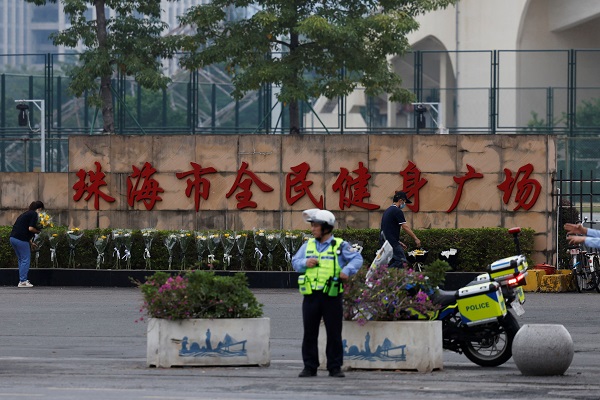 A police officer keeps watch as people remove flower bouquets placed outside the sports centre where a deadly car attack took place, in Zhuhai, Guangdong province, China, 13 November 2024;
Credit: Reuters/Tingshu Wang
A police officer keeps watch as people remove flower bouquets placed outside the sports centre where a deadly car attack took place, in Zhuhai, Guangdong province, China, 13 November 2024;
Credit: Reuters/Tingshu Wang
ZHUHAI, China (Reuters) - Authorities in the southern Chinese city of Zhuhai removed wreaths, candles and bottles of Chinese alcohol, offerings laid at the scene of the deadliest mass killing in the country in a decade, as the government scrambled to respond and censor the outrage online.
On Monday 11 November 2024, a male driver angry at his divorce settlement rammed his car into a crowd at a sports centre in the city of 2.5 million, killing 35 people and injuring 43, but the government took almost a day to announce the death toll.
This prompted an outrage on Chinese social media, where posts complaining about the government's slow response and raising questions about the mental health of a nation shaken by a recent spate of similar killings, were being quickly removed.
"The authorities hadn't released any information - some colleagues mentioned it and I couldn't believe it at first, but it was confirmed later," said a 50-year-old man who identified himself as Zheng who brought flowers to the site.
"It's just a spontaneous feeling I had. Even though I don't know them personally, I had family members who passed away in the past, so I understand that feeling," said Zheng.
Delivery drivers on motor-bikes kept dropping off flowers at the site on Wednesday 13 November 2024 but the bouquets were being immediately removed by security personnel deployed there, sometimes even before a person was able to put them on the ground.
Some wreaths, captured on photographs by Reuters reporters, carried handwritten notes. "Strangers travel well. May there be no demons in heaven," read one. On another: "May there be no thugs in heaven. Good will triumph over evil. Rest in peace."
After initially allowing journalists to briefly speak to the people laying the flowers, a handful of security personnel sporting light blue uniforms and caps told reporters not to talk to the people or to film specific messages on the bouquets.
Addressing media questions about the incident on Wednesday, China's foreign ministry said China was one of the safest countries in the world with a government that has and will always take measures to safeguard lives and social stability.
"As far as we know, there are no casualties that are foreign nationals in this case," ministry spokesperson Lin Jian told a news briefing, adding that China would continue to protect the safety of foreigners.
The attack happened as Zhuhai captured China's attention with the largest aviation exhibition which every two years showcases the nation's civil and military aerospace achievements and where a new stealth jet fighter is on display this year.
While there is no indication that the two events are related, Chinese people often pick large national events with round-the-clock media coverage in an attempt to circumvent the tight censorship and highlight their grievances.
This was the second such incident to occur during the Zhuhai airshow: in 2008, at least four people were killed and 20 injured when a man drove a truck into a crowded schoolyard during the airshow. Police said that attacker had been seeking revenge over a traffic dispute.
"Control the narrative"
China's state broadcaster CCTV did not mention the attack in its 30-minute midday news bulletin. Instead, the programme led with President Xi Jinping's departure for the APEC summit in Peru and devoted a portion of the airtime to the airshow.
Other state media, such as China Daily's Chinese language website, also prominently displayed the news of Xi's Peru trip. The current affairs part of China Daily's website and the local area page did not mention the incident either.
Weibo messaging site censored a hashtag that mentioned the death toll.
Media backed by local government on Tuesday night published a 1,000-word write up of a local officials' meeting on the killing. It emphasised, among other things, the importance of "earnestly shouldering the political responsibility of 'promoting the development of one party and ensuring the safety of one party'" but it did not mention the details of the incident or the death toll.
Rose Luqiu, who researches Chinese censorship at Hong Kong's Baptist University, said the way information was curtailed in Zhuhai was consistent with other incidents in China that involve significant numbers of deaths.
"The censorship is normal because all these incidents are censored to try to control the narrative. The police statement will be the only official explanation, and they won't allow people to challenge or to discuss it," said Luqiu. "I think the purpose of this is to reduce panic and […] if you look at previous incidents like the stabbing of Japanese schoolchildren, they're also trying to reduce the copycat effect."
Luqiu was referring to an incident from September 2024, when an assailant stabbed and ultimately killed a student at a Japanese school in southern China, marking a second such attack on Japanese citizens this year.
Even though there was no indication that Japanese citizens were involved in the Zhuhai attack, the Japanese embassy in Beijing on Tuesday released a warning asking Japanese nationals living in China to keep their voices down when speaking in Japanese and to avoid going out at night.
Luqiu added that in China, local officials can sometimes be fired for incidents that cause mass deaths, even if it is clearly an individual act, so they tend to be reluctant to release any information to the public.
Xi on Tuesday night ordered "all-out efforts" to treat the injured and demanded severe punishment for the perpetrator. The government has dispatched a team to provide guidance on handling of the case.








